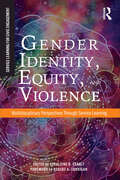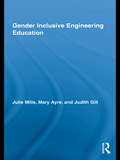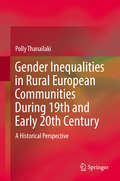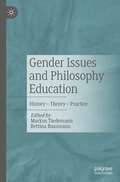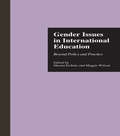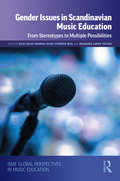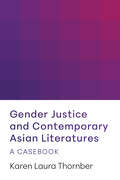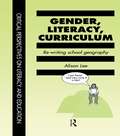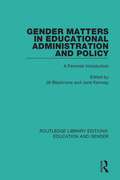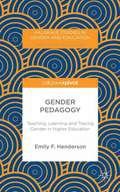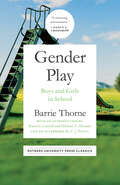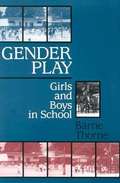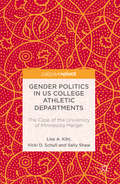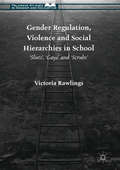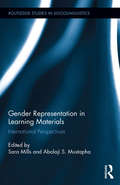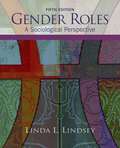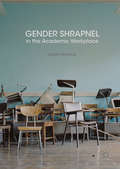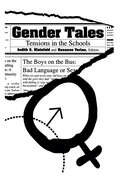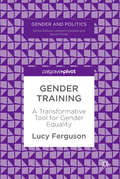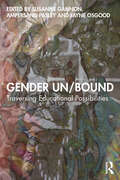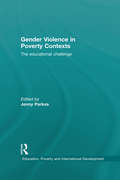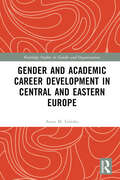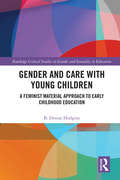- Table View
- List View
Gender Identity, Equity, and Violence: Multidisciplinary Perspectives Through Service Learning
by Robert A. Corrigan Geraldine B. StahlyThe authors of the thirteen chapters in this volume bring excitement and innovations to teaching about gender from a wide range of theoretical and discipline perspectives. They exhibit the inclusiveness that is central to feminist pedagogy–a perspective that centers the educational enterprise in the analysis of the interconnectedness of social categories that have traditionally divided and given root to inequality and oppression and aims for no less than social transformation. Empowerment is a core value in gender education and the experiential approach nurtures that goal. This volume provides many examples of the power of learning through experience as the authors demonstrate that, “…the authority of the feminist teacher as intellectual and theorist finds expression in the goal of making students themselves theorists of their own lives by interrogating and analyzing their own experience.” (Weiler, 1991)To stimulate the adaptation of the approaches described in these books, each volume includes an Activity / Methodology table that summarizes key elements of each example, such as class size, pedagogy, and other disciplinary applications.
Gender Inclusive Engineering Education (Routledge Research in Education)
by Judith Gill Julie Mills Mary Elizabeth AyreWomen continue to comprise a small minority of students in engineering education and subsequent employment, despite the numerous initiatives over the past 25 years to attract and retain more women in engineering. This book demonstrates the ways in which traditional engineering education has not attracted, supported or retained female students and identifies the issues needing to be addressed in changing engineering education to become more gender inclusive. This innovative and much-needed work also addresses how faculty can incorporate inclusive curriculum within their courses and programs, and provides a range of exemplars of good practice in gender inclusive engineering education that will be immediately useful to faculty who teach engineering students.
Gender Inequalities in Rural European Communities During 19th and Early 20th Century: A Historical Perspective
by Polly ThanailakiThis book provides an overview of women’s opportunities for schooling, their social activities, and the social biases they faced in rural communities in Greece, Italy and parts of the Balkans during the 19th and early 20th century. It examines such topics as female illiteracy, the efforts of women-protestant missionaries to expand knowledge through Protestantism, the prejudice against education for women, the socio-economic context, the roles women fulfilled, and the structure of the patriarchal family. The book approaches these issues from the perspective of pedagogy and social history. The fundamental questions discussed by the book are: How was female education viewed by the country folk? What was the role of women in the private and the public sphere? How did peasant women respond to the challenges of the ‘modern’ world? Were they free to express their feelings and ambitions? In what way? Were they happy?
Gender Issues and Philosophy Education: History – Theory – Practice
by Markus Tiedemann Bettina BussmannWith this volume a gap in the philosophical didactics is closed. A historical section initially introduces authors who have determined the gender discourse and at the same time a critical discussion. This is followed by an overview of sexual and gender diversity, its basics and differentiations. Theoretical papers then deal with the relevance of gender research for the self-understanding of philosophical education. Finally, practice-specific contributions demonstrate how topics and aspects of the gender problem can be prepared for different age groups and school types. With 2 lesson plans.
Gender Issues in International Education: Beyond Policy and Practice (Reference Books in International Education)
by Maggie Wilson Sheena ErskineFirst Published in 1999. Routledge is an imprint of Taylor & Francis, an informa company.
Gender Issues in Scandinavian Music Education: From Stereotypes to Multiple Possibilities (ISME Series in Music Education)
by Silje Valde OnsrudGender Issues in Scandinavian Music Education: From Stereotypes to Multiple Possibilities introduces much-needed updates to research and teaching philosophies that envision new ways of considering gender diversity in music education. This volume of essays by Scandinavian contributors looks beyond the dominant Anglo-American lens while confronting a universal need to resist and rethink the gender stereotypes that limit a young person’s musical development. Addressing issues at all levels of music education—from primary and secondary schools to conservatories and universities— topics discussed include: the intersection of social class, sexual orientation, and teachers’ beliefs; gender performance in the music classroom and its effects on genre and instrument choice; hierarchical inequalities reinforced by power and prestige structures; strategies to fulfill curricular aims for equality and justice that meet the diversity of the classroom; and much more! Representing a commitment to developing new practices in music education that subvert gender norms and challenge heteronormativity, Gender Issues in Scandinavian Music Education fills a growing need to broaden the scope of how gender and equality are situated in music education—in Scandinavia and beyond.
Gender Justice and Contemporary Asian Literatures: A Casebook
by Karen Laura ThornberThis casebook investigates how diverse writers from across East, South, and Southeast Asia and their diasporas have engaged with the struggle for gender justice. Each chapter analyzes works of literature originally written in Bengali, Chinese, English, Indonesian, Japanese, Khmer, Korean, Marathi, Thai, and Vietnamese.Aimed at both specialists and nonspecialists, Gender Justice and Contemporary Asian Literatures addresses such subjects as gender imparity in male-dominated professions; the lives of migrant sex workers and caregivers; the fight against reproductive, family, non-partner, and intimate partner violence; and norms of shame and silence surrounding violence against women. Informed by the author's deep knowledge of literature, history, culture, law, and social conditions, this book will be a resource for instructors and students in gender studies, women's studies, ethnic studies, Asian studies, Asian American studies, Asian diaspora studies, comparative literature, and world literature.
Gender Literacy & Curriculum: Rewriting School Geography (Critical Perspectives On Literacy And Education Ser.)
by Alison LeeFirst Published in 1996. Routledge is an imprint of Taylor & Francis, an informa company.
Gender Matters in Educational Administration and Policy: A Feminist Introduction (Routledge Library Editions: Education and Gender #1)
by Jane Kenway Jill BlackmoreOriginally published in 1993. This introductory text brings the somewhat gender blind fields of educational administration and policy into contact with feminism. The chapters here demonstrate the considerable scope and potential of feminist scholarship for the field with regard to theory, research and practice and open up new possibilities for effecting gender justice in and through education. The first part looks at educational history, the second at contemporary issues like assessment, ethical practices, equal opportunities and parental participation, and the third at political and administrative theory.
Gender Pedagogy: Teaching, Learning and Tracing Gender in Higher Education
by Emily F. HendersonWhen addressed in its full reactive potential, gender has a tendency to unfix the reassuring certainties of education and academia. Gender pedagogy unfolds as an account of teaching gender learning that is rooted in Derrida's concept of the 'trace', reflecting the unfixing properties of gender and even shaking up academic knowledge production.
Gender Play: Boys and Girls in School (Suny Series On Sport, Culture, And Social Relations Ser.)
by Barrie ThorneWhen it first appeared in 1993, Barrie Thorne’s Gender Play: Girls and Boys in School became an instant classic in the budding fields of feminist sociology and childhood studies. Through detailed first-hand observations of fourth and fifth graders at play, she investigated questions like: Why do girls and boys tend to self-segregate in the schoolyard? What can playful teasing and ritualized games like “cooties” and “chase and kiss” teach us about how children perform gendered identities? And how do children articulate their own conceptions of gender, distinct from those proscribed by the adult world? A detailed and perceptive ethnography told with compassion and humor, Gender Play immerses readers in the everyday lives of a group of working-class children to examine the social interactions that shape their gender identities. This new Rutgers Classic edition of Gender Play contains an introduction from leading sociologists of gender Michael A. Messner and Raewyn Connell that places Thorne’s innovative research in historical context. It also includes a new afterword by one of Thorne’s own students, acclaimed sociologist C.J. Pascoe, reflecting on both the lasting influence of Thorne’s work and the ways that American children’s understandings of gender have shifted in the past thirty years.
Gender Play: Girls and Boys in School
by Barrie ThorneThorne, a professor of sociology at the University of Southern California, offers her insightful observations of elementary school students in class and at play. Though, as she admits, her status as an adult and an observer may have affected what happened around her, Thorne presents a fascinating account of how children divide themselves--and how others divide them--along gender lines. Breaking students into teams for contests and the eternal game of "cooties" (a contamination attributed more often to girls than boys) reveal much about the microcosm that these students inhabit, and an extensive look at the tomboy, both in literature and in life, compares her ambiguity (sometimes an insult, sometimes a compliment) to the negative attitudes often elicited by gender-crossing in the other direction. Thorne argues convincingly against the theories of scholars like Deborah Tannen and Carol Gilligan that boys and girls have different "cultures," and she attempts to discourage "gender antagonism." A final section offers concrete steps for teachers to take in forming the attitudes--about gender and other topics--of coming generations.
Gender Politics in US College Athletic Departments
by Lisa A. Kihl Vicki D. Schull Sally ShawThis book examines the gendered politics in the context of a merger of the women's and men's athletic departments at the University of Minnesota over a ten year plus span. Examining the athletic department merger helps us understand women's continual under-representation in University athletics despite Title IX legislation passing 40 years ago. Using interview with organizational stakeholders and archival document data, the book explores how organizational change in the form of a merger is gendered with relation to the premerger, merged, post-merger stages.
Gender Regulation, Violence and Social Hierarchies in School
by Victoria RawlingsThis book investigates the reasons why the traditional psychological understanding of bullying fails those affected, and deconstructs how bullying is shaped by prominent discourse. By drawing on poststructuralist feminist theory Victoria Rawlings highlights the social and cultural inequalities too often forgotten in analysis of aggressive behaviour in schools, and places particular emphasis on gender and sexuality as facilitating and constraining forces within school environments and bullying discourses. This book provides a necessary assessment as to why current anti-bullying approaches are failing, and offers an alternative explanation as to how and why bullying occurs. This is a timely and authoritative study which is based on qualitative research, including interviews and group sessions which are used to emphasize the real-life experiences of young people in schools today. Interdisciplinary in nature, this book has a broad appeal and will be of special interest to scholars in the fields of gender and sexuality studies, sociology, and education.
Gender Representation in Learning Materials: International Perspectives (Routledge Studies in Sociolinguistics)
by Sara Mills Abolaji S. MustaphaRepresentations of gender in learning materials convey an implicit message to students about attitudes towards culturally appropriate gender roles for women and men. This collection takes a linguistic approach to exploring theories about gender representation within the sphere of education and textbooks, and their effects on readers and students within an international context. In the opening section, contributors discuss theories of representation and effect, challenging the conventional Althusserian model of interpellation, and acknowledging the challenges of applying Western feminist models within an international context. Following chapters provide detailed analyses focusing on a number of different countries: Australia, Japan, Brazil, Finland, Russia, Hong Kong, Nigeria, Germany, Qatar, Tanzania, and Poland. Through linguistic analysis of vocabulary associated with women and men, content analysis of what women and men say in textbooks, and discourse analysis of the types of linguistic moves associated with women and men, contributors evaluate the extent to which gendered representations in textbooks perpetuate stereotypical gender roles, what the impact may be on learners, and the ways that both teachers and learners interact and engage with these texts.
Gender Roles: A Sociological Perspective
by John Mcmanama Linda L. LindseyFor mid-to-upper level courses in Gender Roles, Introduction to Women's Studies, and Sociology of Sex Roles. This text provides a balanced, non-polarized view of controversial issues that dispel gender myths and demonstrates how material can be meaningfully applied to a student's personal life. Focusing on the most recent research and theory--both in the U. S. and globally--Gender Roles provides an in-depth, survey and analysis of modern gender roles and issues from a sociological perspective while also integrating insights and research from other disciplines like biology, psychology, anthropology and history.
Gender School Society And Inclusive School
by K. ThiyaguGender is a social construct that impacts attitudes, roles, responsibilities and behavior patterns of boys and girls, men and women in all societies. Increasing attention has been given to the importance of achieving gender equality in education.
Gender Shrapnel in the Academic Workplace
by Ellen MayockThis book employs the image of "shrapnel," bits of scattered metal that can hit purposeful targets or unwitting bystanders, to narrate the story of workplace power and gender discrimination. The project interweaves stories of gender shrapnel with an examination of national rhetoric surrounding business, education, and law to uncover underlying phenomena that contribute to discourse on privilege and gender in the academic workplace. Using concrete examples that serve as case studies for subsequent discussion of data about women in the workforce, language use and misuse, sexual harassment, silence and shutting up, and hiring, training, promotion, and the glass ceiling, Mayock explores the deeper implications of gender inequity in the workplace.
Gender Tales: Tensions in the Schools
by Judith S. Kleinfeld Suzanne YerianA book of "real world" cases, this text introduces "flashpoint" issues related to gender equity in the schools. It immerses readers in the human dilemmas teachers face when they set out to provide equal opportunities for -- and to develop the abilities of -- all of their students. Each case, a true but disguised situation, presents the pedagogical concerns, ethical questions, competing values, and complexity of social change teachers face on a daily basis in their classrooms. These cases help readers to identify and understand ideas and issues by relating them to both their own and others' real-life experiences. The book includes activities and discussion questions to involve readers in critical thinking about the issues raised in the cases and in applying this knowledge to their own current or future classroom practice. Using a casebook approach, the text is organized in five sections. Designed to help readers explore the issues raised by contextualizing them in stories that are authentic and engaging, it emphasizes the teacher's role as a skilled professional who thinks critically and makes decisions, and creates lively and involved class discussion by making room for students with diverse perspectives.
Gender Training: A Transformative Tool for Gender Equality (Gender and Politics)
by Lucy FergusonThis book develops a case for feminist gender training as a catalyst for disjuncture, rupture and change. Chapter 1 traces the historical development and current contours of the field of gender training. In Chapter 2, the key critiques of gender training are substantively engaged with from the perspective of reflexive practice, highlighting the need to work strategically within existing constraints. Questions of transformative change are addressed in Chapter 3, which reviews feminist approaches to change and how these can be applied to enhance the impact of gender training. Chapter 4 considers the theory and practice of feminist pedagogies in gender training. In the final chapter, new avenues for gender training are explored: working with privilege; engaging with applied theatre; and mindfulness/meditation. The study takes gender training beyond its often technocratic form towards a creative, liberating process with the potential to evoke tangible, lasting transformation for gender equality.
Gender Un/Bound: Traversing Educational Possibilities
by Jayne Osgood Susanne Gannon Ampersand PasleyThis collection is focused on the possibilities for unbinding people from gendered expectations in and around educational spaces, and accounts for the ways gender is reconstituted in and through education.This book presents a broad interpretation of gender, of what education might mean, and where educational experiences manifest. It explores more conventional schooling spaces to communally generated inclusive spaces, families and marginalised sites where gender is realised and contested. Alongside more familiar framings, the book incorporates decolonial and Indigenous contestations, theoretical innovations and methodological experiments that pry open the ways that gender binds and limits individuals. The chapters are organised in smaller conceptual clusters, offering multiple and overlapping reading paths according to the interests of the reader. A mapping of clusters and potential reading paths is included at the opening of the book, designed for instructors to expand course content.Written to enrich reading for preservice teacher education students and to challenge researchers, postgraduate and doctoral candidates, this book provides essential new perspectives on gender, education and the various ways in which they are un/bound together and apart.
Gender Violence in Poverty Contexts: The educational challenge (Education, Poverty and International Development)
by Jenny ParkesThis book is concerned with understanding the complex ways in which gender violence and poverty impact on young people’s lives, and the potential for education to challenge violence. Although there has been a recent expansion of research on gender violence and schooling, the field of research that brings together thinking on gender violence, poverty and education is in its infancy. This book sets out to establish this new field by offering innovative research insights into the nature of violence affecting children and young people; the sources of violence, including the relationship with poverty and inequality; the effects of violence on young subjectivities; and the educational challenge of how to counter violence. Authors address three interrelated aims in their chapters: to identify theoretical and methodological framings for understanding the relationship between gender, violence, poverty and education to demonstrate how young people living in varying contexts of poverty in the Global South learn about, engage in, respond to and resist gender violence to investigate how institutions, including schools, families, communities, governments, international and non-governmental organisations and the media constrain or expand possibilities to challenge gender violence in the Global South. Describing a range of innovative research projects, the chapters display what scholarly work can offer to help meet the educational challenge, and to find ways to help young people and those around them to understand, resist and rupture the many faces of violence. Gender Violence in Poverty Contexts will appeal to an international audience of postgraduate students, academics and researchers in the fields of international and comparative education, gender and women’s studies, teacher education, poverty, development and conflict studies, African and Asian studies and related disciplines. It will also be of interest to professionals in NGOs and other organisations, and policy makers, keen to develop research-informed practice. Winner of the 2016 Jackie Kirk Outstanding Book Award.
Gender Violence, Art, and the Viewer: An Intervention
by Ellen C. Caldwell, Cynthia S. Colburn, and Ella J. GonzalezThe works covered in college art history classes frequently depict violence against women. Traditional survey textbooks highlight the impressive formal qualities of artworks depicting rape, murder, and other violence but often fail to address the violent content and context. Gender Violence, Art, and the Viewer investigates the role that the art history field has played in the past and can play in the future in education around gender violence in the arts. It asks art historians, museum educators, curators, and students to consider how, in the time of #MeToo, a public reckoning with gender violence in art can revitalize the field of art history.Contributors to this timely volume amplify the voices and experiences of victims and survivors depicted throughout history, critically engage with sexually violent images, open meaningful and empowering discussions about visual assaults against women, reevaluate how we have viewed and narrated such works, and assess how we approach and teach famed works created by artists implicated in gender-based violence. Gender Violence, Art, and the Viewer includes contributions by the editors as well as Veronica Alvarez, Indira Bailey, Melia Belli Bose, Charlene Villaseñor Black, Ria Brodell, Megan Cifarelli, Monika Fabijanska, Vivien Green Fryd, Carmen Hermo, Bryan C. Keene, Natalie Madrigal, Lisa Rafanelli, Nicole Scalissi, Hallie Rose Scott, Theresa Sotto, and Angela Two Stars. It is sure to be of keen interest to art history scholars and students and anyone working at the intersections of art and social justice.
Gender and Academic Career Development in Central and Eastern Europe (Routledge Studies in Gender and Organizations)
by Anna M. GórskaThe nature of academic institutions is inherently gendered. This is because higher education institutions (HEIs) do not operate in a void but, rather, are part and parcel of patriarchal social structures. This book offers a comprehensive presentation of the gendered and gendering academic career development. It explores various scholarly roles that academics face throughout their careers and how they are gendered in their nature. The book connects relevant literature on the topic with novel empirical studies to increase the understanding how gender is played in academia across different roles and different career stages. The empirical context is conducted in Central and Eastern Europe that sheds new light on the gendered and gendering nature in academia in the region. The book also offers propositions on how to undo gender academia to make it a more inclusive workplace for all. Dedicated for an academic reader employed in higher education institutions, particularly among those who are involved in the management of such institutions this volume will be of great interest to researchers, academics, and advanced students in the fields of human resource management, organizational studies, higher education, and gender studies.
Gender and Care with Young Children: A Feminist Material Approach to Early Childhood Education (Routledge Critical Studies in Gender and Sexuality in Education)
by B. Denise HodginsThis book is an exploration of how children, educators, and things become implicated in gendered caring practices. Drawing on a collaborative research study with early childhood educators and young children, the author examines what an engagement with human-and non-human relationality does to complicate conversations about gender and care. By employing a feminist material analysis of early childhood education, this book rethinks dominant Euro-Western individualist pedagogies in order to reposition them within a relationality framework. The analysis illuminates the political and ethical embeddedness of early childhood education and the understanding that gendering and caring emerge with/in a complex web of many relations.
